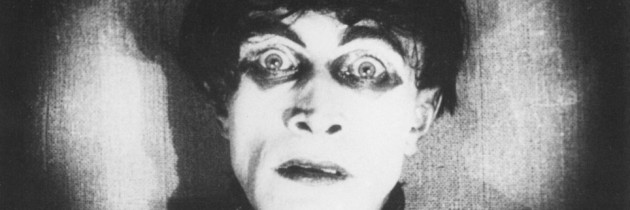From Caligari to Hitler 2.0
What do the movies know that we don’t know? Siegfried Kracauer had some ideas when he published his seminal book From Caligari to Hitler: A Psychological History of the German Film in 1947. Written in New York in self-imposed exile, Kracauer’s book traces the birth of Nazism from the cinema of Weimar Germany (1919-1933), finding a connection between the themes and imagery of German silent movies and the totalitarianism that followed.
Kracauer was a writer, journalist, and sociologist, and one of the preeminent cultural critics of the day. Increasingly critical of capitalism and totalitarianism, he left Germany for Paris in 1933, and went on to New York in 1941. His book remains influential among film historians and theorists. Though it draws fascinating conclusions, many scholars are divided on the validity of its direct link between early German cinema’s dark, murderous undertones – and affinity for megalomaniacal authoritarian figures – and Nazism.
The director of this new film based loosely on Kracauer’s book is Rüdiger Suchsland, a ‘cultural activist’ whose interests include history, Zeitgeist and pop culture. His film features wonderful illustrative clips from unknown and well-known films such as The Cabinet of Dr. Caligari, M., and People on Sunday. These clips are the reason to see the film. Indeed, several film institutes provided Suchsland’s team with crystal-clear prints of these films, some of which are nearly a century old. But when strung together like this, what exactly do they illustrate? It is difficult to find a thread, and Suchsland certainly lacks Kracauer’s powers of persuasion. A variety of talking heads chime in about Weimar cinema in general (Volker Schlöndorff, Thomas Elsaesser), and they are wise and scholarly and insightful. Hamburg filmmaker Fatih Akin makes an appearance, perhaps to lend a modern touch to the proceedings and prevent them from being perceived as musty. But he has no connection other than a gee-whiz appreciation of classic movies, which he seems to have only recently discovered. These contemporary interviews are jarring: shot on grainy video, they make us long to get back to the wonderful black and white imagery of the past.
From Caligari to Hitler is meticulously researched, but ultimately disappointing. It fails by a long shot to deliver on the press release, which promises to take us on an “entertaining roller-coaster ride… into the chasm of the subconscious.” Pick up a copy of Kracauer’s book if you really want to know what he thought the movies know about us that we don’t know.




